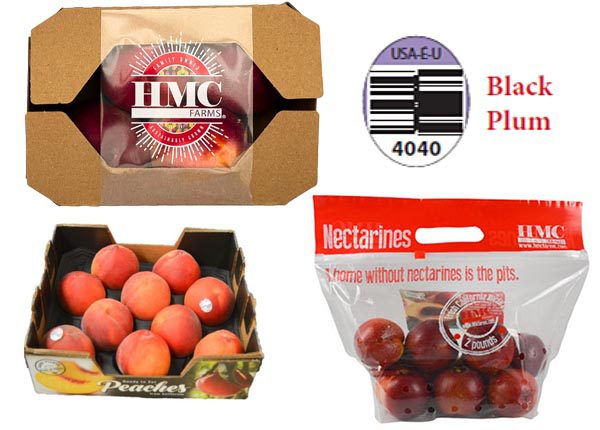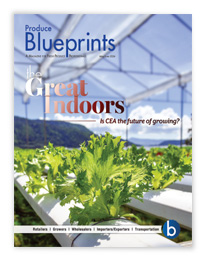FDA released this outbreak update December 14, 2023:
Recalled conventional (non-organic) peaches, plums, and nectarines sold in retail stores from May 1, 2022 through November 15, 2022 and from May 1, 2023 through November 15, 2023.
The recalled fruit was sold at retail stores nationwide in bags or as individual pieces of fruit with PLU stickers, under multiple brand names.
Individual pieces of fruit with PLU stickers on the fruit labeled USA-E-U, containing the following numbers:
- Yellow peach: 4044 or 4038
- White peach: 4401
- Yellow nectarine: 4036 or 4378
- White nectarine: 3035
- Red plum: 4042
- Black plum: 4040
HMC Farms: peaches, plums, or nectarines sold in HMC Farms-branded bags
Signature Farms: peaches or nectarines sold in Signature Farms-branded bags and labeled with 6359 printed on a white sticker on the bag.
See the recall notice for product images.
Additionally, the recalled fruit was sold to other manufacturers who may have frozen and/or relabeled the recalled fruit for resale under another brand. The firm has directly notified their customers who received recalled product and this advisory will be updated as more information becomes available.
Recalled fruit is past expiration and no longer available for sale in retail stores but could have been frozen by consumers. Fresh whole peaches, plums, and nectarines currently available for sale at retail are not included in this recall.
Stores Affected (Updated on 12/14/2023)
The recalled fruit was distributed nationwide and internationally in Canada, Mexico, and Taiwan. In the U.S., the recalled fruit was sold at retail stores in bags or as individual pieces of fruit (see descriptions above).
FDA is aware of the following retailers that received recalled products and have released their own public notices:
- Food Lion stores in DE, MD, NC, PA, VA, WV (includes 2 lb. bags and 4 lb. boxes of peaches, nectarines, or plums)
- Wal-Mart & Sam’s Club
- The following Albertsons Company banner stores: ACME, Albertsons, Balducci’s Food Lovers Market, Carrs, Eagle, Haggen, Kings Food Markets, Lucky, Pavilions, Safeway, Shaw’s, Star Market, and Vons in AK, Southern CA, CO, CT, DE, ID, ME, MD, MA, MT, NE, NV, NH, NJ, NM, NY, ND, OR, PA, RI, SD, UT, VT, VA, D.C., WA, and WY
- ALDI stores in AL, AR, DE, GA, IL, IA, KS, KY, MI, MS, MO, NE, NJ, NC, OK, PA, SC, TN, WI, and VA (includes individual peaches and 2 lb. bags of peaches, nectarines, or plums)
- Sprouts Farmers Market
- H.E. Butt Grocery Co.
FDA is in the process of conducting Recall Audit Checks (RAC) to evaluate the effectiveness of the recall and to collect information, including retailer locations who may have received the recalled product. The list of retail locations, that FDA has reason to believe received the peaches, plums & nectarines included in the HMC Farms recall is available in the recall announcement. The RAC are currently ongoing, and this list may not include all retail establishments that have received the recalled product. This list will be updated as additional information is collected by FDA.
Symptoms of Listeriosis (Listeria Infection)
Symptoms usually start within 2 weeks after eating food contaminated with Listeria, but may start as early as the same day or as late as 10 weeks after. Mild symptoms may include a fever, muscle aches, nausea, tiredness, vomiting, and diarrhea. If the more severe form of listeriosis develops, symptoms may include headache, stiff neck, confusion, loss of balance, and convulsions.
Status
Ongoing: Updates to this advisory will be provided as they become available.
Recommendation
Do not eat, sell, or serve recalled peaches, plums, or nectarines. The recalled fruit is no longer available for sale and any previously purchased fruit should be past shelf life.
If you previously purchased fresh peaches, plums, and nectarines and then froze them, you should throw them away if they are part of the recall or if you cannot tell if they are part of the recall.
Anyone who received or purchased recalled peaches, plums and nectarines should use extra vigilance in cleaning and sanitizing any surfaces and containers that may have come in contact with the recalled fruit to reduce the risk of cross-contamination. This includes baking or canning tools, cutting boards, knives, countertops, refrigerators, freezers, and storage bins.
If you have symptoms of listeriosis you should contact your health care provider to report your symptoms and receive care.
Recommendations for At-Risk Groups
Listeria is most likely to sicken pregnant people and newborns, adults aged 65 or older, and people with weakened immune systems. Other people can be infected with Listeria, but they rarely become seriously ill.
Pregnant people typically experience only fever, fatigue, and muscle aches. However, Listeria infection during pregnancy can lead to miscarriage, stillbirth, premature delivery, or life-threatening infection of the newborn.
Call your healthcare provider right away if you have symptoms of a Listeria infection.
Case Counts
Total Illnesses: 11
Hospitalizations: 10
Deaths: 1
Last Sample Collection: August 16, 2023
States with Cases: CA, CO, FL, IL, KS, MI, OH
Product Distribution: Nationwide and internationally in Canada, Mexico, and Taiwan



